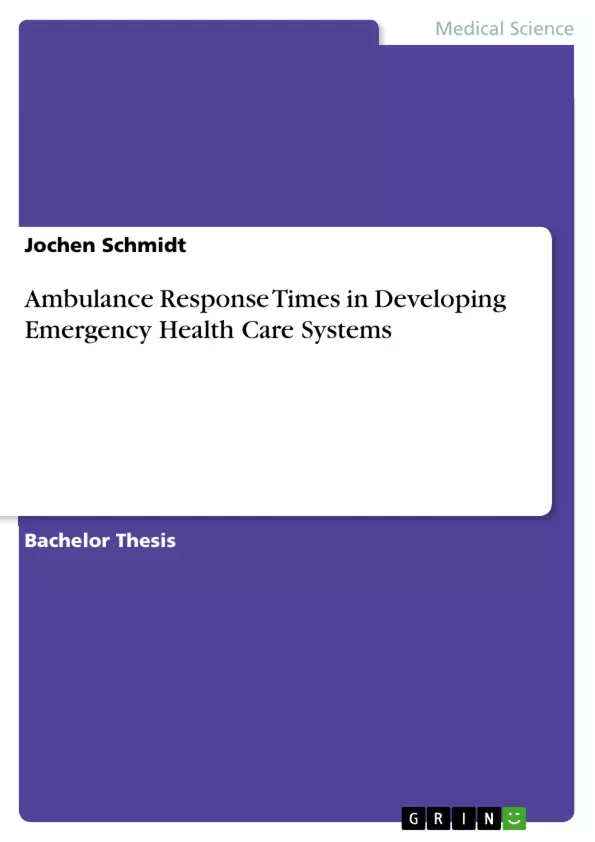Dispatcher training can improve ambulance response times in emergency medical service (EMS) systems in low income countries. Emergency health care systems are of increasing concern in international healthcare developments and the global fight against the burdens of disease. Studies show that emergency health care improvements in developing countries should focus on ambulance response. Low-cost changes including emergency medical dispatch training in developing urban emergency health care systems can improve ambulance response times. Concerns about focusing on ambulance response time as a single indicator are addressed by showing a case sensitive approach for developing emergency health care systems that in return can identify ambulance response as main indicator for a particular system. This approach has been chosen for the subject of study, the Osh Ambulance Service, a municipal EMS in Kyrgyzstan. This particular service, the implemented research, the study design and, the data analysis are presented. The data show that there has been a change from an average response time of 23, 18 minutes to 20, 15 minutes. This data is statistically significant and indicates that the implemented changes, despite severe challenges, likely have an effect, but it is unclear if this change will have a large clinical impact. Further research on emergency medical dispatch and emergency medical response in low- and middle- income countries is encouraged. With increased opportunities and further globalization emergency health care professionals could play a greater role in research and development of emergency medical service systems in resource-limited countries.
Table of Contents
- Statement of the problem
- Introduction
- Why was the research started
- We need to improve health care in 3rd world countries
- In order to do this, we need to improve emergency care
- Ambulance response time plays an important role in improving the outcome of patients in health emergencies
- Ambulance response time has impact on short-term survival
- Need for sustainable approaches in low- and middle-income countries in order to improve emergency health care. One approach could be ambulance response time.
- Introduction
- Survey of the literature
- How do we improve emergency care in an area with limited resources?
- Training is one way to do this.
- Dispatcher Training can be effective.
- How do we evaluate the effectiveness of our training?
- Research design and data collection
- Study design and protocol
- Subjects
- Interventions
- Measurements and other observations
- Explanation of results and relation to examples from the literature.
- Conclusion
Objectives and Key Themes
This research project aims to investigate the impact of dispatcher training on ambulance response times in low-income countries. The study focuses on the development of sustainable approaches to improving emergency health care systems within resource-limited settings. Key themes explored include:- The importance of improving emergency health care in developing countries
- The role of ambulance response time in patient outcomes
- The effectiveness of dispatcher training in improving ambulance response times
- The challenges and considerations associated with developing emergency health care systems in low- and middle-income countries
- The need for a case-sensitive approach to performance indicators in emergency medical services
Chapter Summaries
Statement of the Problem
This chapter introduces the research problem and the context for the study. It highlights the importance of improving emergency health care in developing countries and emphasizes the critical role of ambulance response time in patient outcomes. The need for sustainable approaches to address this challenge in resource-limited settings is also discussed.Survey of the Literature
This chapter reviews existing literature related to improving emergency care in resource-limited settings. It explores the potential of training programs, particularly focusing on dispatcher training, to enhance ambulance response times. The chapter also discusses the evaluation methods used to assess the effectiveness of training programs.Research Design and Data Collection
This chapter outlines the research design and data collection methods employed in the study. It describes the study protocol, the selection of subjects, the interventions implemented, and the measurements used to collect data. The chapter also provides details on the specific emergency medical service system under investigation - the Osh Ambulance Service in Kyrgyzstan.Keywords
The main focus of this project is on emergency health care systems in developing countries, specifically focusing on ambulance response times. Key topics explored include emergency medical dispatch training, performance indicators, and sustainable approaches for improving emergency health care in resource-limited settings. The study also emphasizes the need for a case-sensitive approach to developing emergency health care systems.Frequently Asked Questions
How can dispatcher training improve emergency medical services?
Training dispatchers in low-income countries can lead to more efficient resource allocation and significantly reduce ambulance response times.
What was the impact on response times in the Osh study?
The average response time of the Osh Ambulance Service in Kyrgyzstan decreased from 23.18 minutes to 20.15 minutes after the implementation of training.
Is ambulance response time the only indicator of EMS quality?
While critical for short-term survival, it should be part of a case-sensitive approach that considers clinical outcomes and the specific challenges of the local health system.
Why are sustainable approaches necessary in low-income countries?
Limited resources require low-cost changes, such as training existing staff, rather than expensive infrastructure investments that might not be maintainable.
What role do global health professionals play in EMS development?
They can contribute through research, implementing dispatcher protocols, and developing performance indicators tailored to resource-limited settings.
- Quote paper
- Jochen Schmidt (Author), 2006, Ambulance Response Times in Developing Emergency Health Care Systems, Munich, GRIN Verlag, https://www.grin.com/document/129060



